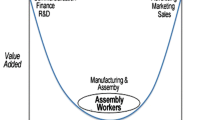Abstract
Commodity chain analysis (Bair and Ramsay, 2003 Multinational Companies and Global Human Resource Strategies) is used to explore where economic pressure (from consumers) or socio-political pressure (from governments and NGOs) can be applied to reduce worker exploitation. Six paths are illustrated with examples of successful and unsuccessful application of pressure. Three conclusions are reached :Economic pressure on companies and brand owners is more likely to lead to improved workplace conditions than socio-political pressure; Brand owners are more likely to implement improved workplace conditions than retailers; and Retailers who are under extreme consumer price pressure will resist improving workplace conditions.
Similar content being viewed by others
References
P. Auger P. Burke T. Devinney J. Louviere (2003) ArticleTitle‘What Will Consumers Pay for Social Product Features’ Journal of Business Ethics 42 281–304 Occurrence Handle000180750100006 Occurrence Handle10.1023/A:1022212816261
J. Bair H. Ramsay (2003) ‘MNCs and Global Commodity Chains: Implications for Labor Strategies’ W. Cooke (Eds) Multinational Companies and Global Human Resource Strategies Quorum Westport, CT
P. Baran P. Sweezy (1966) Monopoly Capital: An Essay on the American Economic and Social Order Penguin Harmondsworth
R. Barnet R. Miller (1974) Global Reach. The Power of the Multinational Corporations Simon and Schuster New York
M. Friedman (1985) ArticleTitle‘Consumer Boycotts in the United States, 1970–1980: Contemporary Events in Historical Perspective’ The Journal of Consumer Affairs 19 96–117
G. Gereffi (1999) ArticleTitle‘International Trade and Industrial Upgrading in the Apparel Commodity Chain’ Journal of International Economics 48 37–70 Occurrence Handle000080527000004 Occurrence Handle10.1016/S0022-1996(98)00075-0
S. Golub (1997) ArticleTitle‘Are International Labor Standards Necessary to Prevent Social Dumping?’ Finance & Development 34 20–24
Greenhouse, S.: 1997, ‘Sporting Goods Concerns Agree to Combat Sale of Soccer Balls Made by Children’, New York Times February 14, 1997, 12.
T. Hemphill (2004) ArticleTitle‘Monitoring Global Corporate Citizenship: Industry Self–regulation at a Crossroads’ The Journal of Corporate Citizenship 14 81–92
Herbert, B.: 1997, ‘Nike’s Boot Camps’, New York Times, March 31, 1997, A–15.
S. Hymer (1971) ‘The Multinational Corporation and the Law of Uneven Development’ J. Baghwati (Eds) Economics and the World Order World Law Fund New York 113–40
A. John J. Klein (2003) ArticleTitle‘The Boycott Puzzle: Consumer Motivations for Purchase Sacrifice’ Management Science 49 1196–1209 Occurrence Handle000185698700006 Occurrence Handle10.1287/mnsc.49.9.1196.16569
A. Kaufman E. Tiantubtim N. Pussayapibul P. Davids (2004) ArticleTitle‘Implementing Voluntary Labour Standards and Codes of Conduct in the Thai Garment Industry’ The Journal of Corporate Citizenship 13 91–100
Knickerbocker, B.: 1997, ‘Nike Fights Full–Court Press on Labor Issue. Shareholder meeting yesterday was marred by charges that Asian labor is underpaid’, Christian Science Monitor, September 23, 1997, 9.
R. Liubicic (1998) ArticleTitle‘Corporate Codes of Conduct and Product Labeling Schemes: The Limits and Possibilities of Promoting International Labor Rights through Private Initiatives’ Law and Policy in International Business 30 111–159
Marketing Week 2004, ‘How the American Dream Became a Global Nightmare’, June 3, 2004, 32.
N. Narayan (1997) ArticleTitle‘Stolen Childhoods: Tackling the Health Burdens of Child Labor’ Harvard International Review 19 50–54
M. Porter (1985) Competitive Advantage: Creating and Sustaining Superior Performance Free Press New York
S. Sen Z. Gurhan–Canli V. Morwitz (2001) ArticleTitle‘Withholding Consumption: A Social Dilemma Perspective on Consumer Boycotts’ Journal of Consumer Research 28 399–417 Occurrence Handle000172762300004 Occurrence Handle10.1086/323729
S. P. Sethi (1996) ArticleTitle‘Working with International Codes of Conduct: Experience of U.S. Companies Operating in South Africa Under the Sullivan Principles’ Business & the Contemporary World III 129–150
Sethi, S. P.: 1999, ‘Codes of Conduct for Multinational Corporations: An Idea Whose Time Has Come’, First Annual Lecture in Global Business Ethics. Fairfield University,March, 1999.
P. Varley (Eds) (1998) The Sweatshop Quandary Investor Responsibility Research Center Washington, DC
T. Wotruba (1997) ArticleTitle‘Industry Self–regulation: A Review and Extention to a Global Setting’ Journal of Public Policy and Marketing 16 38–54
www.beneaththelabel.org, 2/16/2004
www.fairlabor.org, 2/16/2004
www.nlcnet.org, 2/24/2004 The National Labor Committee in Support of Human and Worker Rights. Toys of Misery.
www.sweatshops.org, 2004
Author information
Authors and Affiliations
Additional information
Dr. Gina L.S. Pines received her Ph.D. in Business, Organization and Policy Studies from The City University of New York, Bernard Baruch College of Business. She has held faculty positions at John Jay College of Criminal Justice (CUNY), Rensselaer at Hartford, Fairfield University and Central Connecticut State University. Presently, she is a Visiting Associate Professor of Business Strategy and Policy at the University of Hartford. Prior to her university work, Dr. Pines developed public–private partnerships for The New York City Partnership (a Rockefeller foundation) and The New York City Public Schools. While at the New York City Partnership Dr. Pines developed, applied for and was granted by the New York State Senate, $1.4 million for start up programs and research in business–education partnerships for 10 consecutive years. Dr. Pines has delivered numerous white papers to the New York State Senate. She has presented at academic conferences, most recently in London on human rights violations and corporate social responsibility. Her research has examined CEO career paths and firm strategic choice, strategy formulation, implementation, and evaluation and the exploitation of women and children in lesser developed nations. Presently, she is developing a model specifying the linkages among “guilt triggers” corporate social responsibility and the exploitation of women and children in lesser developed nations. David Meyer is a Professor of Management and Organization at Central Connecticut State University and a Research Fellow at the Fraser Center, Wayne State University. His Ph.D. is in Organizational Behavior and Industrial Relations from the University of Michigan. His research concerns workplace justice, implementing strategy, and problem solving in organizations. He has published in the British Journal of Industrial Relations, Industrial and Labor Relations Review, Industrial Relations, and others.
Rights and permissions
About this article
Cite this article
Pines, G.L.S., Meyer, D.G. Stopping the Exploitation of Workers: An Analysis of the Effective Application of Consumer or Socio-Political Pressure. J Bus Ethics 59, 155–162 (2005). https://doi.org/10.1007/s10551-005-3410-3
Issue Date:
DOI: https://doi.org/10.1007/s10551-005-3410-3




